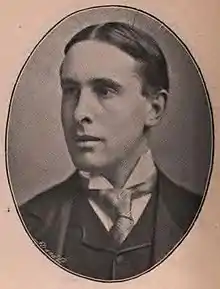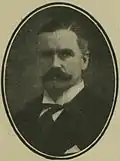Elginshire and Nairnshire (UK Parliament constituency)
Elginshire and Nairnshire was a county constituency in Scotland. From 1832 to 1918, it returned one Member of Parliament (MP) to the House of Commons of the Parliament of the United Kingdom, elected by the first-past-the-post voting system.
| Elginshire and Nairnshire | |
|---|---|
| Former County constituency for the House of Commons | |
| Subdivisions of Scotland | Elginshire and Nairnshire |
| 1832–1918 | |
| Seats | One |
| Created from | Elginshire Nairnshire |
| Replaced by | Moray & Nairn |
Boundaries
The constituency was created in 1832 by the Scottish Reform Act 1832 by a merger of two former constituencies: Elginshire and Nairnshire. It extended to the counties of Elginshire and Nairnshire, with the exception of the burghs of Elgin, Nairn and Forres which were instead part of Inverness Burghs and Elgin Burghs.
It was replaced in 1918 by the new Moray and Nairn constituency, which included all of Elginshire and Nairnshire, including the burghs of Elgin, Nairn and Forres.
Members of Parliament
| Election | Member [1] | Party | |
|---|---|---|---|
| 1832 | Francis Ogilvy-Grant | Tory | |
| 1834 | Conservative | ||
| 1840 by-election | Charles Cumming-Bruce | Conservative | |
| 1868 | James Ogilvy-Grant | Conservative | |
| 1874 | Alexander Duff | Liberal | |
| 1879 by-election | Sir George Macpherson-Grant | Liberal | |
| 1886 | Charles Henry Anderson | Liberal | |
| 1889 by-election | John Seymour Keay | Liberal | |
| 1895 | John Gordon | Conservative | |
| 1906 | Archibald Williamson | Liberal | |
| 1918 | constituency abolished | ||
Politics and history of the constituency
Prior to the 1832 Reform Act, Nairnshire was normally controlled by the Dukes of Argyll or Campbells, the number of voters varying between 15 and 30.[2] The Grants dominated Elginshire which had around 30 voters; both constituencies objected to the merger but without result.
The Act increased the electorate to about 650–700; after 1832, the seat was contested only once in 1841, returning a Conservative until the Liberals took the seat in 1874.
Elections
Elections in the 1830s
| Party | Candidate | Votes | % | ||
|---|---|---|---|---|---|
| Tory | Francis Ogilvy-Grant | Unopposed | |||
| Registered electors | 642 | ||||
| Tory win (new seat) | |||||
| Party | Candidate | Votes | % | ||
|---|---|---|---|---|---|
| Conservative | Francis Ogilvy-Grant | Unopposed | |||
| Registered electors | 690 | ||||
| Conservative hold | |||||
| Party | Candidate | Votes | % | ||
|---|---|---|---|---|---|
| Conservative | Francis Ogilvy-Grant | Unopposed | |||
| Registered electors | 727 | ||||
| Conservative hold | |||||
Elections in the 1840s
Ogilvy-Grant resigned by accepting the office of Steward of the Chiltern Hundreds, causing a by-election.
| Party | Candidate | Votes | % | ±% | |
|---|---|---|---|---|---|
| Conservative | Charles Cumming-Bruce | Unopposed | |||
| Conservative hold | |||||
| Party | Candidate | Votes | % | ±% | |
|---|---|---|---|---|---|
| Conservative | Charles Cumming-Bruce | 372 | 68.3 | N/A | |
| Whig | Alexander Duff[4] | 173 | 31.7 | New | |
| Majority | 199 | 36.6 | N/A | ||
| Turnout | 545 | 72.7 | N/A | ||
| Registered electors | 750 | ||||
| Conservative hold | Swing | N/A | |||
| Party | Candidate | Votes | % | ±% | |
|---|---|---|---|---|---|
| Conservative | Charles Cumming-Bruce | Unopposed | |||
| Registered electors | 718 | ||||
| Conservative hold | |||||
Elections in the 1850s
| Party | Candidate | Votes | % | ±% | |
|---|---|---|---|---|---|
| Conservative | Charles Cumming-Bruce | Unopposed | |||
| Registered electors | 683 | ||||
| Conservative hold | |||||
| Party | Candidate | Votes | % | ±% | |
|---|---|---|---|---|---|
| Conservative | Charles Cumming-Bruce | Unopposed | |||
| Registered electors | 870 | ||||
| Conservative hold | |||||
| Party | Candidate | Votes | % | ±% | |
|---|---|---|---|---|---|
| Conservative | Charles Cumming-Bruce | Unopposed | |||
| Registered electors | 946 | ||||
| Conservative hold | |||||
Elections in the 1860s
| Party | Candidate | Votes | % | ±% | |
|---|---|---|---|---|---|
| Conservative | Charles Cumming-Bruce | Unopposed | |||
| Registered electors | 863 | ||||
| Conservative hold | |||||
| Party | Candidate | Votes | % | ±% | |
|---|---|---|---|---|---|
| Conservative | James Ogilvy-Grant | Unopposed | |||
| Registered electors | 1,580 | ||||
| Conservative hold | |||||
Elections in the 1870s
| Party | Candidate | Votes | % | ±% | |
|---|---|---|---|---|---|
| Liberal | Alexander Duff | 829 | 57.3 | New | |
| Conservative | James Ogilvy-Grant | 619 | 42.7 | N/A | |
| Majority | 210 | 14.6 | N/A | ||
| Turnout | 1,448 | 85.5 | N/A | ||
| Registered electors | 1,693 | ||||
| Liberal gain from Conservative | Swing | N/A | |||
Duff succeeded to the peerage, becoming Earl of Fife.
| Party | Candidate | Votes | % | ±% | |
|---|---|---|---|---|---|
| Liberal | George Macpherson-Grant | 959 | 57.8 | +0.5 | |
| Conservative | Hugh Brodie [6] | 701 | 42.2 | −0.5 | |
| Majority | 258 | 15.6 | +1.0 | ||
| Turnout | 1,660 | 88.1 | +2.6 | ||
| Registered electors | 1,884 | ||||
| Liberal hold | Swing | +0.5 | |||
Elections in the 1880s
| Party | Candidate | Votes | % | ±% | |
|---|---|---|---|---|---|
| Liberal | George Macpherson-Grant | Unopposed | |||
| Registered electors | 1,891 | ||||
| Liberal hold | |||||
| Party | Candidate | Votes | % | ±% | |
|---|---|---|---|---|---|
| Liberal | George Macpherson-Grant | 1,612 | 35.0 | N/A | |
| Conservative | Hugh Fife Ashley Brodie | 1,556 | 33.8 | New | |
| Independent Liberal | Charles Henry Anderson | 1,435 | 31.2 | New | |
| Majority | 56 | 1.2 | N/A | ||
| Turnout | 4,603 | 79.4 | N/A | ||
| Registered electors | 5,796 | ||||
| Liberal hold | Swing | N/A | |||
| Party | Candidate | Votes | % | ±% | |
|---|---|---|---|---|---|
| Liberal | Charles Henry Anderson | 1,991 | 51.5 | +16.5 | |
| Liberal Unionist | George Macpherson-Grant | 1,872 | 48.5 | +14.7 | |
| Majority | 119 | 3.0 | +1.8 | ||
| Turnout | 3,863 | 66.6 | −12.8 | ||
| Registered electors | 5,796 | ||||
| Liberal hold | Swing | +0.9 | |||
Anderson's death caused a by-election.
| Party | Candidate | Votes | % | ±% | |
|---|---|---|---|---|---|
| Liberal | John Seymour Keay | 2,573 | 55.7 | +4.2 | |
| Liberal Unionist | Charles Bowman Logan | 2,044 | 44.3 | −4.2 | |
| Majority | 529 | 11.4 | +8.4 | ||
| Turnout | 4,617 | 79.0 | +12.4 | ||
| Registered electors | 5,844 | ||||
| Liberal hold | Swing | +4.2 | |||
Elections in the 1890s

| Party | Candidate | Votes | % | ±% | |
|---|---|---|---|---|---|
| Liberal | John Seymour Keay | 2,523 | 56.1 | +4.6 | |
| Liberal Unionist | Cameron Gull | 1,978 | 43.9 | −4.6 | |
| Majority | 545 | 12.2 | +9.2 | ||
| Turnout | 4,501 | 77.2 | +10.6 | ||
| Registered electors | 5,830 | ||||
| Liberal hold | Swing | +4.6 | |||
| Party | Candidate | Votes | % | ±% | |
|---|---|---|---|---|---|
| Conservative | John Gordon | 2,147 | 51.5 | +7.6 | |
| Liberal | John Seymour Keay | 2,019 | 48.5 | -7.6 | |
| Majority | 128 | 3.0 | N/A | ||
| Turnout | 4,166 | 73.5 | −3.7 | ||
| Registered electors | 5,669 | ||||
| Conservative gain from Liberal | Swing | +7.6 | |||
Elections in the 1900s
| Party | Candidate | Votes | % | ±% | |
|---|---|---|---|---|---|
| Conservative | John Gordon | 2,334 | 51.9 | +0.4 | |
| Liberal | Archibald Williamson | 2,159 | 48.1 | −0.4 | |
| Majority | 175 | 3.8 | +0.8 | ||
| Turnout | 4,493 | 75.2 | +1.7 | ||
| Registered electors | 5,974 | ||||
| Conservative hold | Swing | +0.4 | |||

| Party | Candidate | Votes | % | ±% | |
|---|---|---|---|---|---|
| Liberal | Archibald Williamson | 3,006 | 66.0 | +17.9 | |
| Conservative | Harry Hope | 1,546 | 34.0 | −17.9 | |
| Majority | 1,460 | 32.0 | N/A | ||
| Turnout | 4,552 | 79.1 | +3.9 | ||
| Registered electors | 5,757 | ||||
| Liberal gain from Conservative | Swing | +17.9 | |||
Elections in the 1910s
| Party | Candidate | Votes | % | ±% | |
|---|---|---|---|---|---|
| Liberal | Archibald Williamson | 2,917 | 62.7 | -3.3 | |
| Conservative | Ralph Glyn | 1,734 | 37.3 | +3.3 | |
| Majority | 1,183 | 25.4 | -6.6 | ||
| Turnout | 4,651 | 80.9 | +1.8 | ||
| Registered electors | 5,748 | ||||
| Liberal hold | Swing | -3.3 | |||
| Party | Candidate | Votes | % | ±% | |
|---|---|---|---|---|---|
| Liberal | Archibald Williamson | Unopposed | |||
| Liberal hold | |||||
General Election 1914–15:
Another General Election was required to take place before the end of 1915. The political parties had been making preparations for an election to take place and by July 1914, the following candidates had been selected;
- Liberal: Archibald Williamson
- Unionist:
References
- Leigh Rayment's Historical List of MPs – Constituencies beginning with "E" (part 1)
- Nairnshire. "The History of Parliament: the House of Commons 1715-1754". History of Parliament Online. Retrieved 12 July 2018.
- Craig, F. W. S., ed. (1977). British Parliamentary Election Results 1832-1885 (e-book) (1st ed.). London: Macmillan Press. ISBN 978-1-349-02349-3.
- "The Evening Chronicle". 12 July 1841. p. 2. Retrieved 18 August 2019 – via British Newspaper Archive.
- Debrett's House of Commons, 1870.
- "Moray and Nairn Election". Aberdeen Press and Journal. 11 September 1879. p. 5. Retrieved 29 December 2017 – via British Newspaper Archive.
- Debrett's House of Commons and the Judicial Bench, 1889
- Craig, FWS, ed. (1974). British Parliamentary Election Results: 1885-1918. London: Macmillan Press. ISBN 9781349022984.
- David Marquand, Ramsay MacDonald, (London: Richard Cohen Books), 1977, p. 22.
- Whitaker's Almanack, 1893
- Whitaker's Almanack, 1900
- Debrett's House of Commons and the Judicial Bench, 1901
- Whitaker's Almanack, 1907
- Debrett's House of Commons and the Judicial Bench, 1916